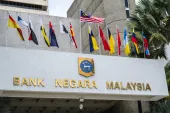
Why Woori Bank's privatisation may be difficult
Domestic buyers may lack the financial ability.
According to Fitch Ratings, the completion of the Korea government's new plan to sell Woori Financial Group (WFH) in three parts is likely to be challenging.. We believe that sales of the two regional banks and the brokerage subsidiary are likely to be more readily achievable. But the privatisation of Woori Bank, the largest part, may be difficult.
Here's more:
The size of Woori Bank, and the government's intention not to sell it to a foreign buyer, means a complete sell-down of the state's stake will remain very challenging.
Domestic purchasers of sufficient scale may lack the financial flexibility to make such an acquisition, especially with the tougher Basel III capital standards being phased in from December 2013.
We believe there is also a high chance for labour issues to arise, as a domestic merger would result in substantial branch overlap - particularly in the cities. Other potential obstacles are capital market conditions and any change in the political agenda after the election set provisionally for June 2014.
We are also less optimistic about the sale because the government has been attempting to sell its whole controlling stake in the group for the past decade. However, we believe Korea's intention to sell is much stronger now, as there is pressure to raise funds for the welfare initiatives that President Park Geun-hye laid out in the presidential election campaign.
The government is also looking to sell a non-controlling stake in Industrial Bank of Korea for the same reasons. We expect the government to remain price sensitive, although less so than before.
The plan to sell the non-core units first is sensible, but could under some conditions place some financial stress on the holding company. In a declining stock market, more of WFH's minority shareholders are likely to cash in their rights through the put-back options they will receive upon each split and sale of non-core subsidiaries.
We believe the government's exit from WFH would benefit governance and operations. Many of the bank's key managers are replaced whenever there are major political changes, leading to a lack of consistency in long-term strategy.
Political influence also means that the group has often acted as if it were a policy bank. We expect sold entities to become more commercially driven.
The new plan, designed to expedite the state's exit from WFH, is for the two regional banks to be spun off as separate bank holding companies before they are divested.
The securities firm will remain in WFH until it is sold. The bidding process for the three main non-core subsidiaries will start in July 2013. The last stage involves the holding company being merged back into Woori Bank before its sale.
The government has a 56.97% stake in WFH through Korea Deposit Insurance Corporation. WFH was established in 2001 by the government to consolidate several banks that failed during the 1997 Asian Crisis.




![Lorem Ipsum [ABF 1]](https://cmg-qa.s3.ap-southeast-1.amazonaws.com/s3fs-public/styles/exclusive_featured_article/public/2025-03/a_hand_pointing_to_a_futuristic_technology_5b87c9d0e3_1.png.webp?itok=2w0y1WhS)


![Cross Domain [Manu + SBR + ABF + ABR + FMCG + HBR + ]](https://cmg-qa.s3.ap-southeast-1.amazonaws.com/s3fs-public/styles/exclusive_featured_article/public/2025-01/earth-3537401_1920_4.jpg.webp?itok=WaRpTJwE)







 Advertise
Advertise

